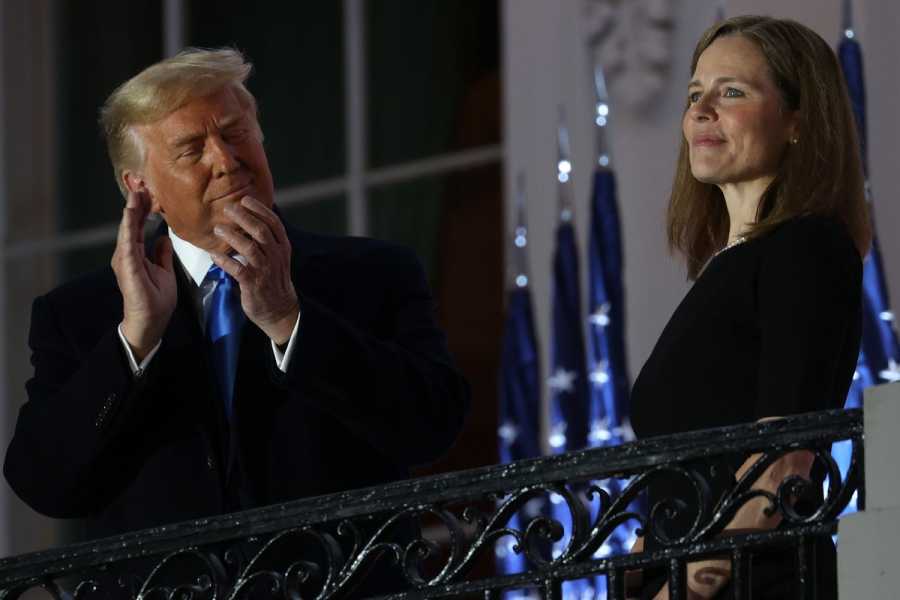The Court’s GOP-appointed majority is very likely to rule for Trump. But it also matters how they rule for Trump.

US President Donald Trump stands with newly sworn-in Supreme Court Associate Justice Amy Coney Barrett during a ceremonial swearing-in event on the South Lawn of the White House, October 26, 2020, in Washington, DC. Tasos Katopodis/Getty Images Ian Millhiser is a senior correspondent at Vox, where he focuses on the Supreme Court, the Constitution, and the decline of liberal democracy in the United States. He received a JD from Duke University and is the author of two books on the Supreme Court.
On Thursday, the Supreme Court hears oral arguments in Trump v. Anderson, the case asking whether former President Donald Trump’s role in the January 6 attack on the US Capitol disqualifies him from seeking the presidency.
The Colorado Supreme Court previously ruled that Trump must be removed from the ballot in that state, under a provision of the Constitution that prohibits former high-ranking officials who engage in “insurrection” from serving again. That decision is now on appeal to the justices.
This is just one of four criminal prosecutions of Trump, and Trump is also a defendant in several high-dollar civil suits. But for today, let’s zoom in on this one.
Broadly speaking, there are several different ways Anderson could come down. The most likely scenario is that he is definitively allowed to run for president again.
Alternatively, there are several ways the Court could punt this case — effectively ruling that Colorado’s courts were wrong for some reason specific to Colorado. They could do this in a way that has broader implications for US election law. Or they could do it in a way that doesn’t, potentially allowing some other state to declare Trump disqualified from the ballot.
Finally, there is at least some chance that the Court could rule against Trump and order him disqualified. This outcome would require at least two of the Court’s Republican appointees to vote to remove the leader of the Republican Party from the 2024 ballot, so it is not especially likely. But it could theoretically happen.
Let’s dig in.
Outcome 1: Total Trump victory
Let’s start with the most likely outcome first. This Court is highly partisan, and Republican appointees control a supermajority of its seats. So most of the justices are likely to be sympathetic to Trump.
Also, the justices probably won’t want to leave the question of whether Trump is disqualified unresolved, lest they have to hear a very similar case again in just a few weeks.
There are some legitimate legal arguments to be made that Colorado has overstepped. But Trump’s lawyers don’t make them. The biggest obstacle to a total Trump victory is that his team makes a very weak case for this outcome in their brief.
vox-mark
Sign up for the newsletter Today, Explained
Thanks for signing up!
Check your inbox for a welcome email.
Email (required)
Oops. Something went wrong. Please enter a valid email and try again.
By submitting your email, you agree to our Terms and Privacy Notice. You can opt out at any time. This site is protected by reCAPTCHA and the Google Privacy Policy and Terms of Service apply. For more newsletters, check out our newsletters page. Subscribe
The Constitution uses the phrase “officer of the United States” to describe former officials who are disqualified from serving again if they engage in insurrection. Trump’s primary argument to the Supreme Court is that the president — the highest-ranking officeholder in the United States — does not count as such an officer.
The premise of this argument is that the framers of the Constitution’s 14th Amendment, the post-Civil War amendment that functioned as a treaty between the victorious Union and the traitorous Confederate states, intended to ban insurrectionist former senators, representatives, governors, state lawmakers, and potentially even city council members from serving in office again. But if a former president betrays his oath of office, that’s fine.
Trump also makes some other arguments in favor of leaving him on the ballot. He argues, for example, that disqualifying him would violate the First Amendment. But his brief spends only about two pages laying out a very thin version of this argument.
So, while most of the justices are probably going to want to rule in Trump’s favor, his legal team gave them very little to work with.
Outcome 2: A temporary Trump victory, but with bad implications for US election law
There are also several ways the Court could reverse the Colorado Supreme Court’s decision while leaving the door open to another court disqualifying Trump again in the near future.
Trump’s brief, for example, argues for a legal theory known as the “independent state legislature doctrine” (ISLD), which would give the justices an unprecedented new power to overrule state supreme courts’ interpretations of their own state’s election laws. It then argues that the Colorado Supreme Court misread that state’s election law, and that the justices should correct this alleged error.
The ISLD, however, is an extraordinarily radical doctrine. In its strongest form, the ISLD neutralizes all state constitutional provisions that protect the right to vote, and gives state legislatures unprecedented power to determine federal elections even over the objection of state governors and state courts. Even in its weaker forms, the ISLD would trigger a flood of federal litigation challenging virtually any state election decision that Republicans dislike.
Indeed, this doctrine is so dangerous that a group of retired admirals and generals recently warned the Court that the ISLD “undermines election integrity and exacerbates both domestic and foreign threats to national security.” Last term, the Court heeded this warning, and rejected a lawsuit seeking to invigorate the ISLD.
Still, a line in that ruling indicates there’s at least some risk that the Court could revive this alarming doctrine in extreme circumstances — which could mean in this case.
Outcome 3: A one-off, temporary victory for Trump
The Court could also reverse the Colorado Supreme Court on narrow grounds that are unlikely to have many implications for future election disputes. The justices could say, for example, that Colorado’s courts failed to provide Trump with adequate due process before removing him from the ballot.
The problem with this outcome, however, is that it would not resolve the question of whether another court could remove Trump from the ballot under the 14th Amendment. Indeed, depending on what the Supreme Court’s opinion says, Colorado could potentially give Trump another trial and then remove him from the ballot all over again.
Outcome 4: Trump loses!
Finally, it is always possible that the Supreme Court could rule that Trump must be removed from the ballot because he engaged in an insurrection. It is also possible that Trump could be abducted by space aliens.
If either of these low-probability events occurs, that would most likely mean that Trump could not seek the presidency in 2024. Given the Court’s partisan breakdown, however, it’s unclear which of these improbable events is more likely to occur.
This story appeared originally in Today, Explained, Vox’s flagship daily newsletter. Sign up here for future editions.
Sourse: vox.com






